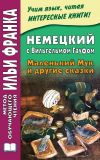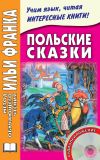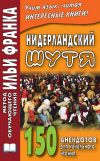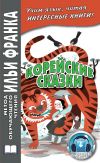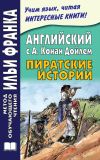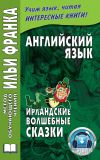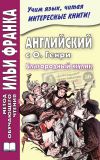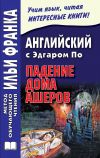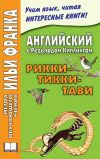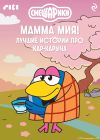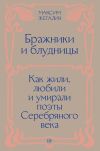Текст книги "Английский с Дэвидом Г. Лоуренсом. Тень в розовом саду / D. H. Lawrence. The Shadow in the Rose Garden"

Автор книги: Дэвид Лоуренс
Жанр: Иностранные языки, Наука и Образование
Возрастные ограничения: +16
сообщить о неприемлемом содержимом
Текущая страница: 4 (всего у книги 14 страниц) [доступный отрывок для чтения: 4 страниц]
“What’s the matter?” he asked determinedly (в чем дело? – спросил он решительно).
She was sick with him (он ей опротивел; sick – чувствующий тошноту; чувствующий скуку, раздражение). She could not look at him (она смотреть на него не могла).
“Can’t you leave me alone (/неужели/ ты не можешь оставить меня в покое: «одну»)?” she replied, averting her face from him (ответила она, отворачивая от него лицо; to avert – отворачивать; отводить /глаза, взгляд, руку/).
He looked at her quickly, fully, wincing with ignominy (он взглянул на нее быстро, пристально, содрогаясь от унижения; fully – полностью, вполне; основательно; to wince – вздрагивать, содрогаться, отшатываться /от испуга, отвращения/). Then he seemed to consider for a moment (потом он как будто раздумывал минуту; to consider – рассматривать, обсуждать; обдумывать).

She rose and turned the lock, afraid he would burst it. She felt hatred towards him, because he did not leave her free. He entered, his pipe between his teeth, and she returned to her old position on the bed. He closed the door and stood with his back to it.
“What’s the matter?” he asked determinedly.
She was sick with him. She could not look at him.
“Can’t you leave me alone?” she replied, averting her face from him.
He looked at her quickly, fully, wincing with ignominy. Then he seemed to consider for a moment.
“There’s something up with you, isn’t there?” he asked definitely (с тобой что-то стряслось, не так ли? – уверенно спросил он; to be up – /разг./ случаться, происходить; definitely – определенно, точно).
“Yes,” she said, “but that’s no reason why you should torment me (да, – сказала она, – но это не повод для того, чтобы ты меня терзал).”
“I don’t torment you (я тебя не терзаю). What’s the matter (в чем дело)?”
“Why should you know?” she cried, in hate and desperation (зачем тебе знать? – воскликнула она в ненависти и отчаянии).
Something snapped (что-то хрустнуло; to snap – щелкать, трещать; захлопывать/ся/ с треском). He started and caught his pipe as it fell from his mouth (он вздрогнул и поймал трубку, выпавшую у него изо рта). Then he pushed forward the bitten-off mouth-piece with his tongue (затем вытолкнул языком откушенный мундштук; to push – толкать, пихать; to bite off – откусывать; to bite – кусать/ся/; piece – кусок; часть; штука, отдельный предмет), took it from off his lips, and looked at it (снял его с губ и посмотрел на него). Then he put out his pipe, and brushed the ash from his waistcoat (потом он погасил трубку и стряхнул пепел со своего жилета; to put – класть, ставить; to put out – тушить, гасить; to brush – чистить щеткой; удалять, смахивать /пыль, мусор/; brush – щетка; waist – талия; coat – пиджак). After which he raised his head (после чего поднял голову).
“I want to know (я хочу знать),” he said. His face was greyish pale, and set uglily (его лицо был землисто-бледным, застывшим уродливо = в безобразной гримасе; greyish – сероватый; grey – серый; set – неподвижный, застывший; to set – ставить, помещать; затвердеть, застыть /о лице, взгляде/; ugly – безобразный, уродливый).

“There’s something up with you, isn’t there?” he asked definitely.
“Yes,” she said, “but that’s no reason why you should torment me.”
“I don’t torment you. What’s the matter?”
“Why should you know?” she cried, in hate and desperation.
Something snapped. He started and caught his pipe as it fell from his mouth. Then he pushed forward the bitten-off mouth-piece with his tongue, took it from off his lips, and looked at it. Then he put out his pipe, and brushed the ash from his waistcoat. After which he raised his head.
“I want to know,” he said. His face was greyish pale, and set uglily.
Neither looked at the other (ни один /из них/ не смотрел на другого). She knew he was fired now (она знала, что теперь он рассвирепел; fire – огонь, пламя; пыл; страсть; to fire – зажигать; воспламенять/ся/; раздражаться, свирепеть). His heart was pounding heavily (его сердце тяжело колотилось; to pound – бить, колотить; сильно биться /о сердце/). She hated him, but she could not withstand him (она ненавидела его, но не могла ему противостоять; to withstand – устоять, выдержать; противостоять). Suddenly she lifted her head and turned on him (внезапно она подняла голову и набросилась на него; to turn – поворачивать/ся/; to turn /up/on smb. – набрасываться на кого-л.).
“What right have you to know?” she asked (какое у тебя есть право знать? – спросила она).
He looked at her (он посмотрел на нее). She felt a pang of surprise for his tortured eyes and his fixed face (она почувствовала взрыв удивления = ее до боли поразили его измученные глаза и застывшее лицо; pang – внезапная острая боль; внезапное проявление эмоции; to torture – пытать; мучить, терзать; torture – пытка; муки, агония). But her heart hardened swiftly (но ее сердце быстро ожесточилось; to harden – делать/ся/ твердым; закалять/ся/; ожесточать/ся/). She had never loved him (она никогда его не любила). She did not love him now (и теперь его не любила).
But suddenly she lifted her head again swiftly (но вдруг она снова быстро вскинула голову), like a thing that tries to get free (как существо, которое пытается освободиться; thing – вещь, предмет; существо). She wanted to be free of it (она хотела быть свободной от этого). It was not him so much, but it, something she had put on herself, that bound her so horribly (не столько от него, сколько от чего-то, что она сама на себя надела, что связывало ее так ужасно; to put on – надевать; to bind – вязать, связывать; обязывать /законом, договором и т. д./).

Neither looked at the other. She knew he was fired now. His heart was pounding heavily. She hated him, but she could not withstand him. Suddenly she lifted her head and turned on him.
“What right have you to know?” she asked.
He looked at her. She felt a pang of surprise for his tortured eyes and his fixed face. But her heart hardened swiftly. She had never loved him. She did not love him now.
But suddenly she lifted her head again swiftly, like a thing that tries to get free. She wanted to be free of it. It was not him so much, but it, something she had put on herself, that bound her so horribly.
And having put the bond on herself, it was hardest to take it off (и поскольку она сама надела на себя эти оковы, сбросить их было труднее всего; bond – связь, узы; hard – твердый, жесткий; тяжелый, трудный; требующий напряжения; to take off – снимать, сбрасывать). But now she hated everything and felt destructive (но сейчас она ненавидела всё и чувствовала себя разрушительной = жаждала разрушений). He stood with his back to the door, fixed (он стоял спиной к двери, неподвижный; fixed – неподвижный; неизменный; застывший /о взгляде, выражении лица/; to fix – устанавливать; прикреплять, закреплять; застывать), as if he would oppose her eternally, till she was extinguished (будто собирался противостоять ей вечно, пока она не исчезнет; to oppose – быть против; бороться, противостоять; to extinguish – гасить, тушить; уничтожать; убивать /надежду, любовь и т. д./; гаснуть). She looked at him (она посмотрела него). Her eyes were cold and hostile (ее глаза были холодны и враждебны). His workman’s hands spread on the panels of the door behind him (его руки рабочего раскинулись на панелях двери позади него; to spread – расстилать/ся/, распространять/ся/; протягивать; panel – панель, филёнка).
“You know I used to live here (ты знаешь, что я прежде здесь жила; used to – иметь обыкновение, привычку делать что-л. в прошлом; to use – использовать, применять)?” she began, in a hard voice, as if wilfully to wound him (начала она жестким голосом, словно чтобы нарочно задеть его; wilfully – упрямо, своенравно; преднамеренно, сознательно; to wound – ранить; причинить боль; задеть). He braced himself against her, and nodded (он собрался с духом против нее = чтобы ей противостоять, и кивнул; to brace – связывать, скреплять; to brace oneself – напрячь все силы; собраться с духом; brace – связь; скоба, скрепа).
“Well, I was companion to Miss Birch of Torril Hall (я была компаньонкой мисс Бёрч из Торрил-Холл; companion – товарищ; компаньон/ка/; hall – зал, холл; помещичий дом, усадьба) – she and the rector were friends, and Archie was the rector’s son (они с пастором были друзьями, а Арчи был сыном пастора).” There was a pause (наступила пауза). He listened without knowing what was happening (он слушал, не понимая, что происходит; without – без; без того, чтобы; так, чтобы не).

And having put the bond on herself, it was hardest to take it off. But now she hated everything and felt destructive. He stood with his back to the door, fixed, as if he would oppose her eternally, till she was extinguished. She looked at him. Her eyes were cold and hostile. His workman’s hands spread on the panels of the door behind him.
“You know I used to live here?” she began, in a hard voice, as if wilfully to wound him. He braced himself against her, and nodded.
“Well, I was companion to Miss Birch of Torril Hall – she and the rector were friends, and Archie was the rector’s son.” There was a pause. He listened without knowing what was happening.
He stared at his wife (он пристально глядел на жену). She was squatted in her white dress on the bed (она сидела на корточках в белом платье на кровати), carefully folding and re-folding the hem of her skirt (тщательно сгибая и разгибая подол юбки; carefully – осторожно; тщательно; careful – заботливый; старательный, тщательный; care – забота; внимание; тщательность; hem – подогнутый и подшитый край одежды). Her voice was full of hostility (ее голос был полон враждебности).
“He was an officer – a sub-lieutenant (он был офицером, младшим лейтенантом) – then he quarrelled with his colonel and came out of the army (потом он поссорился с полковником и ушел из армии). At any rate” – she plucked at her skirt hem (так или иначе, – она дернула подол юбки; at any rate – во всяком случае, как бы то ни было; rate – норма, размер; цена; оценка; to pluck – ощипывать /птицу/; дергать; тащить), her husband stood motionless, watching her movements which filled his veins with madness (ее муж стоял неподвижно, наблюдая за ее движениями, которые наполняли его вены бешенством; madness – сумасшествие; ярость, бешенство) – “he was awfully fond of me, and I was of him – awfully (он ужасно любил меня, а я его… ужасно; awfully – ужасно; /эмоц. – усил./ крайне, очень; awful – страшный, ужасный; внушающий страх, благоговение; awe – благоговейный страх, трепет; fond – любящий).”
“How old was he?” asked the husband (сколько ему было лет? – спросил муж).
“When – when I first knew him (когда – когда я только с ним познакомилась)? Or when he went away (или когда он уехал…)? – ”

He stared at his wife. She was squatted in her white dress on the bed, carefully folding and re-folding the hem of her skirt. Her voice was full of hostility.
“He was an officer – a sub-lieutenant – then he quarrelled with his colonel and came out of the army. At any rate” – she plucked at her skirt hem, her husband stood motionless, watching her movements which filled his veins with madness – “he was awfully fond of me, and I was of him – awfully.”
“How old was he?” asked the husband.
“When – when I first knew him? Or when he went away? —”
“When you first knew him (когда ты только с ним познакомилась).”
“When I first knew him, he was twenty-six (когда я с ним только познакомилась, ему было двадцать шесть…) – now – he’s thirty-one – nearly thirty-two (сейчас… ему тридцать один… почти тридцать два…) – because I’m twenty-nine, and he is nearly three years older (потому что мне двадцать девять, а он почти на три года старше…; nearly – почти; около, примерно) —”
She lifted her head and looked at the opposite wall (она подняла голову и посмотрела на противоположную стену).
“And what then?” said her husband (и что дальше? – спросил муж).
She hardened herself, and said callously (она ожесточилась и сказала безразлично; callous – огрубелый, мозолистый; бесчувственный, грубый):
“We were as good as engaged for nearly a year, though nobody knew (мы были практически обручены около года, хотя никто не знал…; as good as – почти, всё равно что; engaged – занятый; обрученный; помолвленный; to engage – заниматься /чем-л./; обещать, брать на себя обязательство; обручаться) – at least – they talked – but – it wasn’t open (по крайней мере… поговаривали… но… об этом не было объявлено; at least – по крайней мере, как минимум; least – минимальное количество, малейшая степень; малейший; open – открытый; явный, всем известный). Then he went away (потом он уехал…) —”

“When you first knew him.”
“When I first knew him, he was twenty-six – now – he’s thirty-one – nearly thirty-two – because I’m twenty-nine, and he is nearly three years older —”
She lifted her head and looked at the opposite wall.
“And what then?” said her husband.
She hardened herself, and said callously:
“We were as good as engaged for nearly a year, though nobody knew – at least – they talked – but – it wasn’t open. Then he went away —”
“He chucked you?” said the husband brutally (он бросил тебя? – жестоко сказал муж; to chuck – бросать; кидать; швырять; /разг./ бросать /работу/; порвать /с кем-л./; brutally – жестокий, зверский; грубый), wanting to hurt her into contact with himself (желая причинить ей боль и тем самым принудить ее к общению с собой; to hurt – причинять боль; ранить; обидеть, задеть; contact – соприкосновение, контакт; связь, контакт; to come into contact with – соприкасаться; установить контакт с). Her heart rose wildly with rage (ее сердце вскипело от ярости; to rise – восходить; вставать, подниматься; усиливаться; wild – дикий; бурный, необузданный; исступленный). Then “Yes”, she said, to anger him (тогда она сказала «да», чтобы разозлить его). He shifted from one foot to the other, giving a “Ph!” of rage (он переминался с ноги на ногу, издавая яростное «фф!»). There was silence for a time (некоторое время стояло молчание).
“Then,” she resumed, her pain giving a mocking note to her words (потом, – продолжала она, и ее боль придавала словам насмешливую нотку; to resume – возобновлять, продолжать; to mock – насмехаться; высмеивать), “he suddenly went out to fight in Africa (он внезапно уехал сражаться в Африку; suddenly – вдруг, внезапно, неожиданно; sudden – внезапный, неожиданный; to fight – драться; сражаться, воевать), and almost the very day I first met you (и почти в тот самый день, когда я только познакомилась с тобой; to meet – встречать/ся/; знакомиться), I heard from Miss Birch he’d got sunstroke (я узнала от мисс Бёрч, что у него был солнечный удар…; to hear – слышать; узнавать) – and two months after, that he was dead (а через два месяца, что он умер…; later – позже; dead – мертвый; умерший) —”
“That was before you took on with me?” said the husband (это было до того, как ты закрутила со мной? – спросил муж; to take on – брать /работу и т. д./; браться /за дело и т. д./).

“He chucked you?” said the husband brutally, wanting to hurt her into contact with himself. Her heart rose wildly with rage. Then “Yes”, she said, to anger him. He shifted from one foot to the other, giving a “Ph!” of rage. There was silence for a time.
“Then,” she resumed, her pain giving a mocking note to her words, “he suddenly went out to fight in Africa, and almost the very day I first met you, I heard from Miss Birch he’d got sunstroke – and two months after, that he was dead —”
“That was before you took on with me?” said the husband.
There was no answer (ответа не было). Neither spoke for a time (какое-то время ни один не говорил). He had not understood (он раньше не понял). His eyes were contracted uglily (его глаза мерзко сощурились; to contract – сжимать/ся/, сокращать/ся/; суживать/ся/).
“So you’ve been looking at your old courting places (значит, ты навещала места своих прежних шашней; to look – смотреть; осматривать; to court – ухаживать, добиваться расположения)!” he said. “That was what you wanted to go out by yourself for this morning (вот куда ты хотела пойти одна нынче утром).”
Still she did not answer him anything (она по-прежнему ничего ему не отвечала). He went away from the door to the window (он отошел от двери к окну). He stood with his hands behind him, his back to her (он стоял, заложив сзади руки, спиной к ней). She looked at him (она посмотрела на него). His hands seemed gross to her, the back of his head paltry (его руки показались ей грубыми, затылок – презренным; gross – грубый, вульгарный; back – спина; тыльная сторона, задняя часть; paltry – ничтожный, мелкий; жалкий, презренный).
At length, almost against his will, he turned round, asking (наконец, чуть не против своей воли, он повернулся и спросил; almost – почти; едва не):
“How long were you carrying on with him (как долго у тебя с ним была связь; to carry on – продолжать/ся/; /разг./ флиртовать; иметь любовную связь)?”

There was no answer. Neither spoke for a time. He had not understood. His eyes were contracted uglily.
“So you’ve been looking at your old courting places!” he said. “That was what you wanted to go out by yourself for this morning.”
Still she did not answer him anything. He went away from the door to the window. He stood with his hands behind him, his back to her. She looked at him. His hands seemed gross to her, the back of his head paltry.
At length, almost against his will, he turned round, asking:
“How long were you carrying on with him?”
“What do you mean?” she replied coldly (что ты имеешь в виду/что ты хочешь сказать? – холодно ответила она; to mean – иметь в виду, подразумевать).
“I mean how long were you carrying on with him (я хочу сказать, как долго у тебя с ним была связь)?”
She lifted her head, averting her face from him (она подняла голову, отворачивая от него лицо). She refused to answer (она отказывалась отвечать). Then she said (затем сказала):
“I don’t know what you mean, by carrying on (не знаю, что ты хочешь сказать этим «была связь»). I loved him from the first days I met him (я любила его с первых дней, как повстречала…) – two months after I went to stay with Miss Birch (через два месяца после того, как я уехала жить у мисс Бёрч; to stay – оставаться; останавливаться, жить; гостить).”
“And do you reckon he loved you?” he jeered (и ты думаешь, он тебя любил? – язвил он; to reckon – считать /особ. в уме/, подсчитывать; думать, полагать; to jeer – насмехаться, язвить).
“I know he did (я знаю, что любил).”
“How do you know, if he’d have no more to do with you (как = откуда ты знаешь, если он решил больше не знаться с тобой; to have to do with – иметь отношение /к кому-л., чему-л./; быть связанным /с кем-л., чем-л./; знать /кого-л./)?”

“What do you mean?” she replied coldly.
“I mean how long were you carrying on with him?”
She lifted her head, averting her face from him. She refused to answer. Then she said:
“I don’t know what you mean, by carrying on. I loved him from the first days I met him – two months after I went to stay with Miss Birch.”
“And do you reckon he loved you?” he jeered.
“I know he did.”
“How do you know, if he’d have no more to do with you?”
There was a long silence of hate and suffering (настало долгое молчание /, полное/ ненависти и страдания).
“And how far did it go between you (и как далеко зашло между вами)?” he asked at length, in a frightened, stiff voice (спросил он наконец испуганным, сдавленным голосом; to frighten – пугать; fright – сильный внезапный испуг; stiff – жесткий, тугой; оцепеневший; неловкий).
“I hate your not-straightforward questions,” she cried, beside herself with his baiting (ненавижу твои окольные вопросы, – воскликнула она, вне себя от его издевательств; straightforward – прямой; движущийся или идущий прямо вперед; открытый, откровенный; straight – прямой, неизогнутый; beside – рядом, около; вне, за пределами; baiting – травля; to bait – травить /собаками/; изводить, не давать покоя). “We loved each other, and we were lovers – we were (мы любили друг друга, и мы были любовниками – да, были). I don’t care what you think: what have you got to do with it (мне все равно, что ты думаешь: какое ты имеешь к этому отношение = тебе-то что за дело; to care – заботиться; беспокоиться, тревожиться)? We were lovers before ever I knew you (мы были любовниками до того, как я вообще познакомилась с тобой…; ever – всегда; когда-либо; для эмоц. усиления) —”
“Lovers – lovers,” he said, white with fury (любовниками… любовниками, – повторил он, белый от ярости). “You mean you had your fling with an army man (ты хочешь сказать, что погуляла с военным: «армейским человеком»; fling – бросок, швыряние; разгул, веселое жилье; to have one`s fling – перебеситься, отдать дань увлечениям юности; army – армия), and then came to me to marry you when you’d done (а потом пришла ко мне, чтобы я на тебе женился, когда ты…) —”
She sat swallowing her bitterness (она сидела, глотая горечь; to swallow – глотать, проглатывать; подавлять, сдерживать; bitterness – горечь /прям. и перен./; bitter – горький; мучительный). There was a long pause (наступила долгая пауза).

There was a long silence of hate and suffering.
“And how far did it go between you?” he asked at length, in a frightened, stiff voice.
“I hate your not-straightforward questions,” she cried, beside herself with his baiting. “We loved each other, and we were lovers – we were. I don’t care what you think: what have you got to do with it? We were lovers before ever I knew you —”
“Lovers – lovers,” he said, white with fury. “You mean you had your fling with an army man, and then came to me to marry you when you’d done —”
She sat swallowing her bitterness. There was a long pause.
“Do you mean to say you used to go – the whole hogger (ты хочешь сказать, что тогда ты… пошла на всё; to go the whole hog – /разг./ делать что-л. основательно, доводить до конца; полностью отдаваться /чему-л./; hog – /брит./ боров; /амер./ свинья; whole hogger – человек, идущий до конца, ничего не жалеющий)?” he asked, still incredulous (спросил он, все еще не веря; incredulous – недоверчивый).
“Why, what else do you think I mean?” she cried brutally (ну а что еще, по-твоему, я хочу сказать? – грубо выкрикнула она; why – почему?; как! ба! ну конечно! ведь /выражает удивление, согласие, недоверие и т. д./).
He shrank, and became white, impersonal (он съежился и сделался бледным и отчужденным; to shrink – садиться /о ткани/; сжиматься, съеживаться; white – белый; бледный; impersonal – обезличенный; равнодушный; холодный, отчужденный; personal – личный). There was a long, paralysed silence (наступило долгое парализованное = скованное молчание; silence – тишина; молчание). He seemed to have gone small (он, казалось, уменьшился: «стал маленьким»; to go – идти, ходить; становиться).
“You never thought to tell me all this before I married you (ты и не думала рассказать мне всё это до того, как я на тебе женился),” he said, with bitter irony, at last (сказал он наконец с горькой иронией).
“You never asked me,” she replied (ты никогда меня не спрашивал, – ответила она).
“I never thought there was any need (я никогда и не думал, что есть необходимость).”

“Do you mean to say you used to go – the whole hogger?” he asked, still incredulous.
“Why, what else do you think I mean?” she cried brutally.
He shrank, and became white, impersonal. There was a long, paralysed silence. He seemed to have gone small.
“You never thought to tell me all this before I married you,” he said, with bitter irony, at last.
“You never asked me,” she replied.
“I never thought there was any need.”
“Well, then, you should think (ну, значит, тебе следовало подумать).”
He stood with expressionless, almost childlike set face (он стоял с ничего не выражающим, застывшим в почти детской гримасе лицом; expressionless – невыразительный; ничего не выражающий; expression – выражение; to express – выражать; childlike – по-детски простой; child – ребенок, дитя), revolving many thoughts, whilst his heart was mad with anguish (обдумывая множество мыслей, в то время как его сердце обезумело от муки/страданий; to revolve – вращать/ся/; обдумывать, размышлять).
Suddenly she added (неожиданно она прибавила):
“And I saw him today (и я видела его сегодня),” she said. “He is not dead, he’s mad (он не мертвый, он сумасшедший).”
Her husband looked at her, startled (ее муж смотрел на нее, пораженный; to startle – испугать; поразить; вздрогнуть).
“Mad!’ he said involuntarily (сумасшедший! – невольно произнес он).

“Well, then, you should think.”
He stood with expressionless, almost childlike set face, revolving many thoughts, whilst his heart was mad with anguish.
Suddenly she added:
“And I saw him today,” she said. “He is not dead, he’s mad.”
Her husband looked at her, startled.
“Mad!’ he said involuntarily.
“A lunatic (душевнобольной),” she said. It almost cost her her reason to utter the word (ей стоило почти рассудка произнести это слово = она чуть не лишилась рассудка, произнося это слово; to cost – стоить /какую-л. сумму/; стоить, обходиться; reason – причина, довод; ум, здравый рассудок /в противоп. сумасшествию/). There was a pause (повисла пауза).
“Did he know you?” asked the husband in a small voice (он тебя узнал? – спросил муж тихим голосом; small – маленький; тихий, негромкий /о звуке, голосе/).
“No (нет),” she said.
He stood and looked at her (он стоял и смотрел на нее). At last he had learned the width of the breach between them (наконец-то он осознал ширину пропасти между ними; to learn – учиться; узнавать; breach – брешь, пролом). She still squatted on the bed (она по-прежнему сидела на коленях на кровати). He could not go near her (он не мог приблизиться к ней). It would be violation to each of them to be brought into contact with the other (для каждого из них было бы осквернением коснуться другого; violation – нарушение; насилие; осквернение; to bring – приносить; привозить; приводить; to bring into contact with – помочь встретиться, свести; сталкивать, приводить в соприкосновение). The thing must work itself out (всё должно уладиться само собой; thing – вещь; дело; ситуация; to work out – удаваться, получаться; решать /проблему, задачу/). They were both shocked so much (они оба были столь потрясены), they were impersonal, and no longer hated each other (они были отчуждены и больше не ненавидели друг друга). After some minutes he left her and went out (через несколько минут он оставил ее и вышел).

“A lunatic,” she said. It almost cost her her reason to utter the word. There was a pause.
“Did he know you?” asked the husband in a small voice.
“No,” she said.
He stood and looked at her. At last he had learned the width of the breach between them. She still squatted on the bed. He could not go near her. It would be violation to each of them to be brought into contact with the other. The thing must work itself out. They were both shocked so much, they were impersonal, and no longer hated each other. After some minutes he left her and went out.
Внимание! Это не конец книги.
Если начало книги вам понравилось, то полную версию можно приобрести у нашего партнёра - распространителя легального контента. Поддержите автора!
